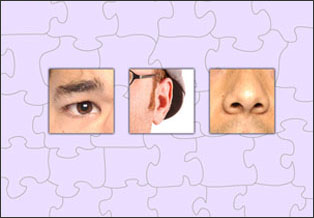
A new study conducted at the University of Haifa proves the connection between hearing and sight. The research proved that the auditory system "reports" to the visual system the messages it has received. In a study conducted by Prof. Avi Karni from the Interdisciplinary Center for Brain and Behavior Research at the University of Haifa, subjects were asked to read certain words, and it was found that reading the words was affected by hearing them. This influence begins already at the most basic levels of brain processing, and it is clear that processing in the visual system is influenced by specific experiences of the auditory system.
The study conducted with the research student, Anna Sterkin from the Weizmann Institute of Science and the University of Haifa, in collaboration with Prof. Tzvia Barznitz from the University of Haifa and Dr. Tami Kushnir from the Haim Sheba Medical Center in Tel Hashomer, examined how visual processing (reading words) is affected by previous experience of hearing words The test was done both at the level of behavioral performance and at the level of brain processing, using the images of neural activity in the brains of the participants with the help of an MRI device.
"We performed two series of experiments," explained Prof. Carney, "in the first experiment, the subjects read a list of words and performed a certain task related to them, and after about half a minute they read the same list of words and performed the task again. We tested the differences in brain activity and reaction speed between the first and second time. As expected, the second time the task was performed faster and brain activity decreased. The second experiment was the same as the first, except for one change - the list of words was played in the subjects' ears, before they read it for the first time."
The researchers hypothesized that if hearing words affects reading them, the difference between the first and second reading after hearing the words will decrease or disappear - and it did. "The findings prove that the auditory system 'helped' the visual system to make a preliminary acquaintance with the words before reading them," said the researchers and noted another finding that hearing one list of words does not affect the reading of another list of words. This result indicates that the visual system responds more effectively only to those words heard in the recent past.
According to Prof. Carney, previous studies have shown that in the brains of subjects who were born blind, touching ("reading") text in braille may activate the visual cortex and similarly, in subjects who were deaf from birth, it was found that reading text may activate areas of the cerebral cortex that specialize in processing auditory information. "These findings indicated that given a severe sensory deprivation, from birth, brain areas that are designed to process sensory information of a given type are capable of processing information from another sense. The new study proves that even among healthy people, whose vision and hearing are normal, a similar process exists," he concluded.
The results of the research were presented at an international symposium on the use of electrophysiological dimensions in the processing of linguistic information at the University of Haifa.
Drafting and editing: H. J. Glykasm, translations and technical writing
